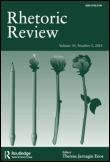
Rhetoric Review
Scope & Guideline
Elevating Conversations in Rhetoric and Literary Theory
Introduction
Aims and Scopes
- Rhetorical Theory and Criticism:
The journal publishes works that advance the theoretical frameworks of rhetoric, addressing its historical roots and contemporary applications. This includes analysis of classical texts and modern interpretations. - Social Justice and Activism:
A consistent focus on the intersection of rhetoric with social justice issues, including feminist rhetoric, racial justice, and environmental activism, showcasing how rhetorical practices can facilitate change. - Digital and Visual Rhetoric:
Exploration of the implications of digital media on rhetorical practices, including studies on social media, digital storytelling, and visual communication, reflecting the evolving nature of rhetoric in the digital age. - Rhetoric in Education:
Research that examines rhetorical education and pedagogy, particularly in the context of composition studies and its impact on student engagement and learning outcomes. - Identity and Cultural Rhetorics:
Investigations into how rhetoric shapes and is shaped by identity, including explorations of race, gender, sexuality, and cultural narratives, contributing to a deeper understanding of diverse rhetorical practices.
Trending and Emerging
- Community-Engaged Rhetorics:
An increasing number of papers focus on community engagement and environmental justice, reflecting a growing interest in how rhetoric can address pressing social issues and facilitate collective action. - Rhetoric and Technology:
There is a notable trend toward exploring the relationship between rhetoric and technology, particularly concerning digital media and artificial intelligence, suggesting an awareness of how technological advancements are reshaping rhetorical practices. - Intersectionality in Rhetoric:
A rising emphasis on intersectionality, particularly regarding race, gender, and class within rhetorical studies, indicates a commitment to examining how diverse identities influence rhetorical practices and their implications. - Activist Rhetorics:
The journal is increasingly publishing work that examines rhetoric as a tool for activism, highlighting how rhetorical strategies can be employed to advocate for social change and justice. - Rhetorical Education Innovations:
Emerging themes in rhetorical education, particularly innovative pedagogical approaches and the impact of rhetoric on student engagement, suggest a shift towards practical applications of rhetoric in academic settings.
Declining or Waning
- Traditional Rhetorical Figures:
There appears to be a reduced emphasis on the study of classical rhetorical figures and techniques, suggesting a shift towards more contemporary and applied rhetorical practices rather than theoretical explorations of traditional rhetoric. - Historical Rhetorical Analysis:
Fewer papers are focusing solely on historical rhetorical analysis, indicating a potential waning interest in examining past rhetoric without connecting it to current social or political issues. - Rhetorical Studies in Isolated Contexts:
Studies that examine rhetoric in isolated or niche contexts seem to be less frequent, as the journal trends towards more integrative approaches that connect rhetoric to broader social movements and interdisciplinary themes.
Similar Journals
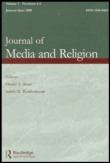
Journal of Media and Religion
Transforming Understanding of Media's Role in Religious PracticesThe Journal of Media and Religion is a leading interdisciplinary journal dedicated to exploring the complex interactions between media and religion. Published by Routledge Journals, Taylor & Francis Ltd, this journal serves as a critical platform for researchers and practitioners within the fields of communication and religious studies. With an impressive impact factor and a distinguished ranking—placing it in the top quartile for Religious Studies and the second quartile for Communication—Journal of Media and Religion showcases high-quality research that enhances our understanding of how media influences religious practices and vice versa. The journal has been converging insightful contributions from 2010 to 2024, fostering scholarly dialogue and innovative methodologies. As an essential resource for academics, professionals, and students alike, it promotes open access to groundbreaking studies, facilitating the exchange of ideas that shape both fields.
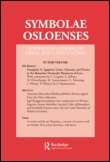
Symbolae Osloenses
Connecting Scholars Through Timeless InsightsSymbolae Osloenses, published by TAYLOR & FRANCIS LTD, is a distinguished journal in the field of Classics, with a rich history dating back to its inception in 1922. This UK-based journal has continuously contributed to the scholarly discourse surrounding ancient cultures, languages, and literature, making it a crucial resource for researchers, educators, and students alike. Though it operates under a subscription model, its impact on the academic community is underscored by its recent inclusion in the 2023 Scopus rankings, where it holds a respectable position in the 65th percentile among its peers. With decades of published research spanning from 1924 to 2023, Symbolae Osloenses remains committed to fostering robust academic dialogue and advancing knowledge in the Classics, catering to a diverse readership seeking to explore the nuances of classical studies.

RHETORICA-A JOURNAL OF THE HISTORY OF RHETORIC
Unveiling Historical Narratives in RhetoricRHETORICA: A Journal of the History of Rhetoric, published by the Johns Hopkins University Press, is a pivotal resource in the fields of linguistics and literary studies. Established in 1983, this esteemed journal facilitates scholarly discourse on the evolution, theory, and practice of rhetoric, making it indispensable for researchers, educators, and students alike. With a notable ISSN of 0734-8584 and an e-ISSN of 1533-8541, it has established a reputable presence in academic circles. Though currently categorized in Q4 of Linguistics and Language, its robust focus on historical analysis situates it in the broader landscape of Arts and Humanities, where it ranks impressively in literature and literary theory (76th percentile). While RHETORICA does not offer open access, it continues to serve as a beacon for those seeking to understand the complexities of rhetorical history, inviting contributions that illuminate its enduring relevance in contemporary discourse.

Res Rhetorica
Encouraging Innovative Perspectives in RhetoricRes Rhetorica is a distinguished open-access journal published by the Polish Rhetoric Society, dedicated to advancing the fields of communication and linguistics since its establishment. With a commitment to fostering scholarly discourse, the journal aims to explore the nuances of rhetorical theory and practice, unveiling critical insights that illuminate the interplay between language and societal dynamics. Based in Poland and operating from the University of Warsaw's Department of Italian Studies, Res Rhetorica has gained recognition in the academic community, receiving a Q4 ranking in Communication and a Q3 ranking in Linguistics and Language for 2023. Although its HIndex is currently undefined, the journal's strategic focus on open-access publishing since 2014 facilitates widespread dissemination and engagement with its research articles. Spanning converged years from 2019 to 2024, this journal serves as an essential resource for researchers, professionals, and students alike, encouraging innovative perspectives and collaborative dialogue in the vibrant realms of rhetoric, language, and communication.

COLLEGE COMPOSITION AND COMMUNICATION
Fostering Critical Conversations in Literary Theory.COLLEGE COMPOSITION AND COMMUNICATION, published by the NATL COUNCIL TEACHERS ENGLISH, stands as a pivotal academic journal in the fields of Education, Linguistics, and Literature. With its ISSN 0010-096X and E-ISSN 1939-9006, the journal has achieved significant recognition, evidenced by its diverse quartile rankings: Q3 in Education, Q2 in Linguistics and Language, and Q1 in Literature and Literary Theory for 2023. It currently enjoys a Scopus ranking of #55 out of 1106 in the domain of Literature and Literary Theory, placing it in the esteemed 95th percentile. This journal serves as a vital forum for scholars, educators, and students, aiming to advance the discourse on composition and communication studies, share innovative pedagogical practices, and critically examine the interrelations between language and literature. Although it is not an open-access journal, its comprehensive insights make it essential for anyone invested in the evolving paradigms of language education and composition theory. With reflective articles extending from 2004 to the present, COLLEGE COMPOSITION AND COMMUNICATION continues to shape and redefine the landscape of academic and educational research.
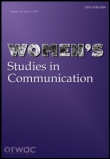
Womens Studies in Communication
Championing Innovative Research in Gender StudiesWomens Studies in Communication, published by Routledge Journals, Taylor & Francis Ltd, stands as a pivotal platform for scholars and practitioners in the fields of communication and gender studies. With an impressive history of publishing since 1977, this journal delves into the intricate intersections of gender and communication, fostering critical dialogue and innovative research. It currently holds a category quartile ranking of Q2 in both Communication and Gender Studies, reflecting its significant impact in these vital fields. With an ongoing commitment to exploring the nuances of women's voices and experiences in various communicative contexts, the journal provides an invaluable resource for understanding contemporary societal issues. While currently not available as an open-access publication, its adherence to high academic standards, evidenced by its Scopus rankings, making it an essential read for researchers, students, and professionals eager to enrich their understanding of gender dynamics in communication.
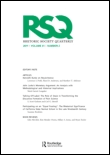
Rhetoric Society Quarterly
Connecting Generations Through Rhetorical Research.Rhetoric Society Quarterly, ISSN 0277-3945, is a distinguished academic journal published by Routledge Journals, Taylor & Francis Ltd, based in the United Kingdom. Since its inception in 1976, the journal has become a vital platform for scholarly discourse in the fields of Communication and Linguistics and Language, showcasing research that examines the complexities of rhetoric across various contexts. Currently enjoying a Q2 ranking in Communication and an impressive Q1 ranking in Linguistics and Language, it is recognized for its rigorous peer-review process and commitment to quality. With an H-index reflective of its scholarly influence and reaching across generations of research leading up to 2024, the journal continues to be a crucial resource for researchers, educators, and practitioners. Although it does not currently offer open access options, readers can expect high-quality, impactful articles that contribute significantly to their fields. Explore the rich tradition of rhetorical scholarship and engage with a community dedicated to advancing knowledge and practice within this ever-evolving domain.

COLLEGE ENGLISH
Elevating Standards in English Education ResearchCOLLEGE ENGLISH, ISSN 0010-0994, is a premier academic journal published by the NATIONAL COUNCIL OF TEACHERS OF ENGLISH that serves as a pivotal platform for the advancement of research and scholarly discussion in the fields of education and linguistics. With a strong focus on the intersection of language and teaching, this journal has established its reputation with notable Scopus rankings, achieving a Q2 category in Education and a Q1 category in Linguistics and Language as of 2023. The journal’s commitment to high-quality research is further evidenced by its placement in the top 20th percentile for Arts and Humanities—Language and Linguistics. By providing a rigorous forum for educators, researchers, and students alike, COLLEGE ENGLISH fosters an environment conducive to innovative ideas and interdisciplinary dialogue, promoting deeper understanding and effective teaching practices. Although it does not provide Open Access options, the journal continues to be an essential resource for those aiming to enhance their academic pursuits in the evolving landscape of language education.
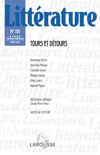
LITTERATURE
Advancing Critical Conversations in Literary Analysis.LITTERATURE is a distinguished academic journal published by LAROUSSE, dedicated to the exploration and critical discourse of literary studies. Based in France, this journal, with ISSN 0047-4800 and E-ISSN 1958-5926, serves as a vital platform for scholars, students, and professionals interested in both contemporary and historical literary theory. Despite its current categorization in the Q4 quartile of literature and literary theory for 2023, LITTERATURE aspires to elevate discussions within the field, providing a peer-reviewed environment for innovative research and theoretical exploration. The journal covers an extensive range of topics, including literary criticism, narrative theory, and cultural studies, ensuring it remains relevant in an evolving academic landscape. With an unwavering commitment to fostering scholarly communication, LITTERATURE invites contributions that challenge conventional perspectives and push the boundaries of literary analysis, aiming to bridge the gap between academic scholarship and broader societal narratives.
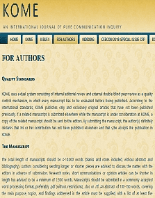
KOME-An International Journal of Pure Communication Inquiry
Exploring Innovative Perspectives in Pure Communication InquiryKOME-An International Journal of Pure Communication Inquiry is a scholarly journal published by Ludovika University Press in Hungary, dedicated to advancing the study and understanding of communication across various contexts. Since its inception in 2012 as an open-access journal, KOME aims to foster a vibrant dialogue among researchers, professionals, and students by providing a platform for innovative research in the fields of Communication and Linguistics. With its recent classification as a Q3 journal in Communication and Q2 in Linguistics and Language, KOME stands out as a valuable resource, ranking in the 70th percentile for Linguistics and Language and 47th percentile for Communication in Scopus. Researchers are encouraged to submit original articles, reviews, and case studies that contribute to the evolving discourse on pure communication inquiries. Located at Ludovika ter 2, Budapest, this journal not only promotes academic excellence but also ensures that scholarly works are accessible to a global audience, reinforcing the importance of communication studies in our interconnected world.